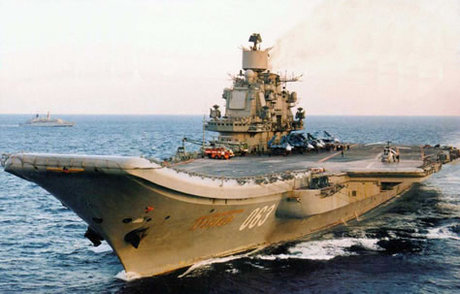NOVANEWS
by Naharnet Newsdesk

Russian naval vessels in the Mediterranean are capable of reacting to an escalation in the Syria conflict, a military source said Wednesday, as Moscow fine tunes its maritime presence ahead of possible U.S. military action.
“Today we consider our presence in the eastern Mediterranean to be sufficient to solve the tasks. If necessary, together with submarine forces, they (the ships) are capable even today of influencing a military situation,” a general staff source told the Interfax news agency.
“We are ready to solve sudden task. For that, the naval group is being corrected for the corresponding variants of the outcome of events,” the source added, without giving further details.
According to Interfax, the Russian destroyer Smetlivy will soon join the group in the Mediterranean as well as the destroyer Nastoichivy.
The anti-submarine ship Admiral Panteleyev has already entered its zone of operation as the flagship of the current rotation of the naval grouping in the Mediterranean, a military source told the agency.
The missile cruiser Moskva, from the Black Sea fleet, has now left its assignment in the northern Atlantic and is now on its way to the eastern Mediterranean.
On arrival it will assume the role as the Russian flagship, Interfax said.
Already in place in the eastern Mediterranean are the frigate Neustrashimy, as well as the landing ships Alexander Shabalin, the Admiral Nevelsky and the Peresvet.
They will be joined by the large landing ships Novocherkassk and Minsk on September 5-6, Interfax said. As previously reported, the reconnaissance ship Priazovye is also on its way to join the group.
The U.S. already has a strong naval presence in the region and the possible U.S. military action launched against Syria is widely expected to be launched from the sea.
Russia has kept a constant presence in the eastern Mediterranean during the Syrian crisis, rotating its group every few months.
Russia also has a naval base in the Syrian port of Tartus, an heirloom from Moscow’s close relationship with Damascus under the Soviet Union.
According to Russian media reports, Russian naval personnel have largely now been withdrawn from the base, a modest but hugely strategic facility which Moscow calls a “point of military-technical supply of the Russian Navy.”
Moscow vehemently opposes U.S.-led plans for military action against the regime of Bashar Assad in response to an alleged chemical attack outside Damascus, warning it risks destabilizing the entire region.
“Today we consider our presence in the eastern Mediterranean to be sufficient to solve the tasks. If necessary, together with submarine forces, they (the ships) are capable even today of influencing a military situation,” a general staff source told the Interfax news agency.
“We are ready to solve sudden task. For that, the naval group is being corrected for the corresponding variants of the outcome of events,” the source added, without giving further details.
According to Interfax, the Russian destroyer Smetlivy will soon join the group in the Mediterranean as well as the destroyer Nastoichivy.
The anti-submarine ship Admiral Panteleyev has already entered its zone of operation as the flagship of the current rotation of the naval grouping in the Mediterranean, a military source told the agency.
The missile cruiser Moskva, from the Black Sea fleet, has now left its assignment in the northern Atlantic and is now on its way to the eastern Mediterranean.
On arrival it will assume the role as the Russian flagship, Interfax said.
Already in place in the eastern Mediterranean are the frigate Neustrashimy, as well as the landing ships Alexander Shabalin, the Admiral Nevelsky and the Peresvet.
They will be joined by the large landing ships Novocherkassk and Minsk on September 5-6, Interfax said. As previously reported, the reconnaissance ship Priazovye is also on its way to join the group.
The U.S. already has a strong naval presence in the region and the possible U.S. military action launched against Syria is widely expected to be launched from the sea.
Russia has kept a constant presence in the eastern Mediterranean during the Syrian crisis, rotating its group every few months.
Russia also has a naval base in the Syrian port of Tartus, an heirloom from Moscow’s close relationship with Damascus under the Soviet Union.
According to Russian media reports, Russian naval personnel have largely now been withdrawn from the base, a modest but hugely strategic facility which Moscow calls a “point of military-technical supply of the Russian Navy.”
Moscow vehemently opposes U.S.-led plans for military action against the regime of Bashar Assad in response to an alleged chemical attack outside Damascus, warning it risks destabilizing the entire region.



